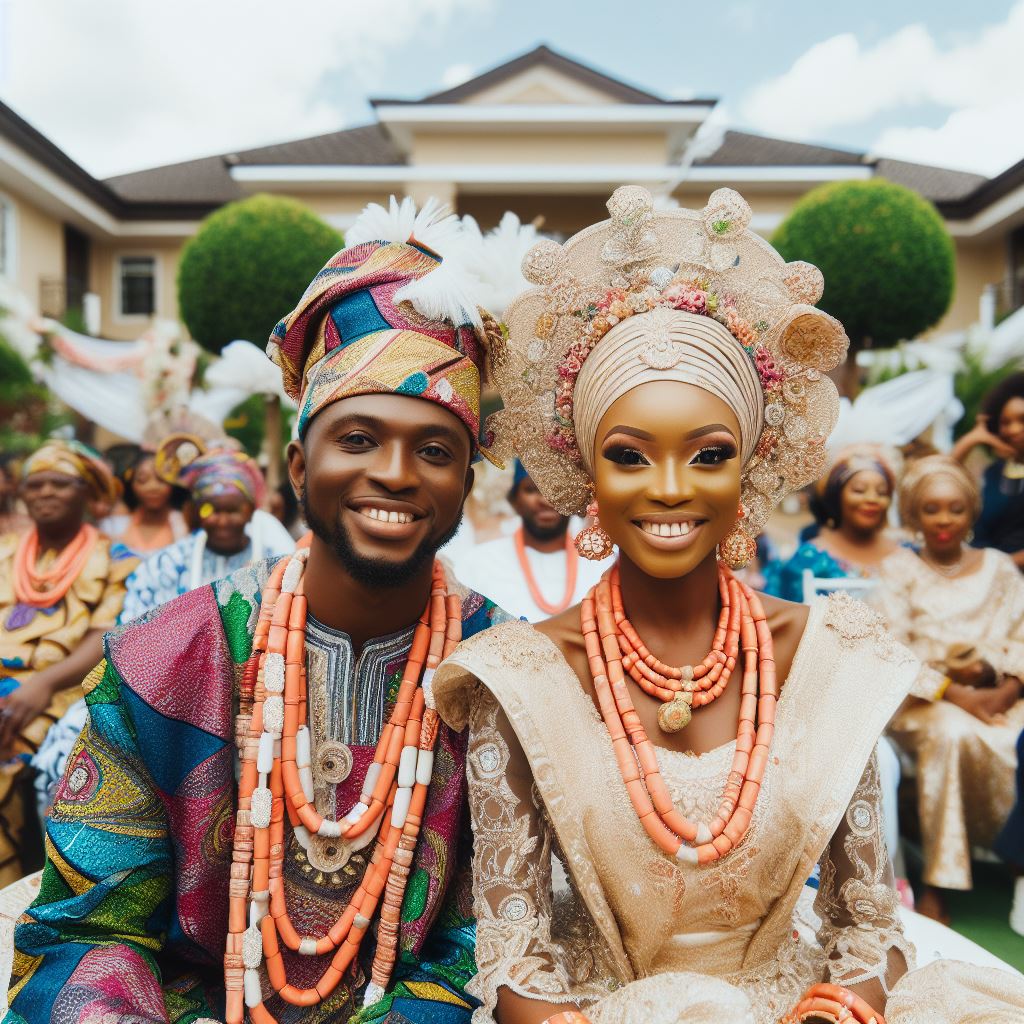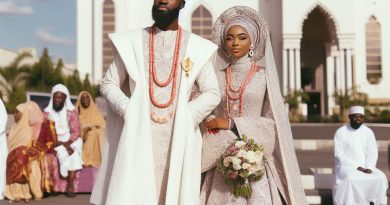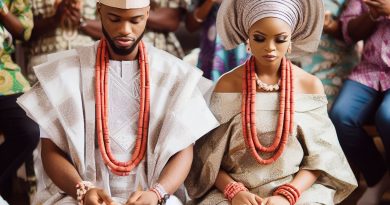Intertribal Marriages in Nigeria: Bridging Cultures
Last Updated on October 17, 2023
Introduction
Intertribal marriages in Nigeria are a captivating phenomenon, emblematic of the nation’s rich tapestry of cultural diversity and unity.
These marriages play a crucial role in bridging the gaps between different Nigerian cultures. They serve as a microcosm of the broader effort to promote unity and harmony within the country.
In a country as ethnically diverse as Nigeria, the significance of intertribal marriages cannot be overstated. They represent a beautiful amalgamation of distinct customs, languages, and traditions.
This fusion is a testament to the remarkable ability of love to transcend cultural boundaries.
Throughout this section, we will explore the multifaceted aspects of intertribal marriages in Nigeria, delving into the challenges, joys, and, most importantly, the way they contribute to a more unified.
Definition of Intertribal Marriage
Intertribal marriage in the Nigerian context refers to the union between individuals from different ethnic tribes.
It involves the coming together of people from diverse cultural backgrounds.
These marriages often bridge the gap between different tribes, promoting unity and intercultural understanding.
In Nigeria, intertribal marriages are common and have become an integral part of the society.
They are seen as a means of fostering national cohesion and breaking down tribal barriers.
Intertribal marriages are a reflection of Nigeria’s rich cultural diversity and multicultural heritage.
Nigeria is home to over 250 ethnic tribes, each with its unique language, traditions, and customs
The country encompasses diverse cultural groups, including the Hausa, Yoruba, Igbo, Fulani, Ijaw, and many more.
These tribes exhibit distinct cultural practices and have different languages, costumes, and traditional values.
Nigeria’s cultural diversity is often described as a tapestry of various ethnicities.
Intertribal marriages allow for the merging of these diverse cultures, promoting tolerance and acceptance.
It also provides an opportunity for individuals to learn about different traditions and broaden their horizons.
The significance of these marriages in bridging different cultures
- They contribute to the nation’s cultural integration by fostering mutual respect and harmony.
- Intermarriages enable individuals to experience different traditions and break stereotypes.
- Children from intertribal marriages often grow up bilingual, embracing both their parents’ cultural heritage.
- These children become cultural ambassadors, promoting unity while cherishing their diverse backgrounds.
- Intertribal marriages serve as a platform for cultural exchange and enrichment, strengthening Nigeria’s unity.
- They promote diversity, tolerance, and intercultural understanding within the Nigerian society.
- Intertribal marriages showcase Nigeria’s cultural richness and contribute to its national identity.
- Through these unions, individuals learn to appreciate and respect the beauty of different traditions.
- They also provide a foundation for a harmonious and united Nigeria, despite its diverse cultural landscape.
- Intertribal marriages are a testament to the power and beauty of love transcending cultural boundaries.
In fact, intertribal marriages in Nigeria serve as bridges connecting different tribes and cultures.
Reasons for Intertribal Marriages
Love and personal compatibility as primary factors
- Love knows no tribal boundaries and transcends cultural differences to bring individuals together.
- Intertribal marriages often arise from a deep connection and shared values between partners.
- Compatibility on a personal level plays a significant role in intertribal marriages.
- Couples prioritize emotional connection and take into account shared interests, beliefs, and goals.
- Choosing a life partner based on love and compatibility enhances the success of intertribal marriages.
- Appreciation for each other’s uniqueness strengthens the bond and paves the way for a harmonious relationship.
Economic benefits and opportunities
- Intertribal marriages often bring about connections and alliances that lead to improved economic prospects.
- By marrying someone from a different tribe, individuals gain access to new networks and business opportunities.
- Combining resources from two different tribal backgrounds can create a powerful economic partnership.
- Intertribal marriages can lead to the establishment of joint ventures or businesses that benefit both communities.
- Economic benefits from intertribal marriages ripple through the families and contribute to overall household growth.
- Increased financial stability enables both partners to provide better lives for themselves and their future generations.
Desire to foster cultural integration and understanding
- Intertribal marriages are often driven by the desire to promote cultural diversity and integration.
- By marrying outside their tribe, individuals bridge cultural gaps and encourage mutual understanding.
- Intertribal couples become ambassadors of their respective cultures, breaking down stereotypes and prejudices.
- The blending of traditions and customs in intertribal marriages fosters a more inclusive and enriched society.
- Children from intertribal marriages experience a rich blend of cultures, creating a multicultural upbringing.
- 6. Intertribal marriages serve as a catalyst for cultural exchange, leading to greater harmony and unity.
Generally, intertribal marriages in Nigeria are fueled by various factors that contribute to the enrichment of both individuals and society as a whole.
Love, personal compatibility, economic benefits, and the desire for cultural integration all play significant roles in shaping these relationships.
By embracing intertribal marriages, Nigerians can celebrate diversity, strengthen bonds between tribes, and create a more harmonious and unified nation.
Read: A Toast to Love: Local Drinks for Nigerian Anniversaries
Challenges in Intertribal Marriages
Traditional and cultural barriers
- The diverse traditional and cultural practices of different tribes create challenges in intertribal marriages.
- Traditions such as dowry, marriage ceremonies, and rituals can vary greatly between tribes, leading to conflicts.
- Intertribal couples often face resistance from families who might be strongly attached to their cultural beliefs and practices.
- These barriers can lead to misunderstandings, tension, and difficulties in finding common ground between the two cultures.
- Respect and understanding of each other’s traditions are crucial to navigate these challenges in intertribal marriages.
Language and communication difficulties
- One of the significant challenges in intertribal marriages is the language barrier between partners from different tribes.
- The difference in language can hinder effective communication and create misunderstandings.
- Intertribal couples must work on overcoming this challenge by learning each other’s language or finding a common means of communication.
- Language difficulties can also affect the bond between the couple and their ability to express emotions and thoughts openly.
- Efforts to learn and understand each other’s languages can strengthen the relationship and promote cultural integration.
Extended family expectations and reactions
- In intertribal marriages, the expectations and reactions of the extended families can pose significant challenges.
- Family members may express concerns about the compatibility of the couple’s cultures, values, and traditions.
- Negative reactions from family members can create stress and strain on the relationship.
- It is essential for the couple to address these concerns and involve the families in discussions and activities that promote cultural understanding.
- Open communication, patience, and compromise are vital in managing the expectations and reactions of extended families.
Intertribal marriages in Nigeria encounter various challenges stemming from traditional and cultural differences, language barriers, and extended family expectations.
However, with understanding, respect, and effective communication, these challenges can be overcome.
The couple should focus on finding common ground, learning each other’s languages, and involving their families in promoting cultural integration.
Read: Eternal Love and Unity: Prayers for Your Nigerian Marriage Milestone
Benefits of Intertribal Marriages
Enhanced cultural exchange and understanding
- Intertribal marriages provide a unique opportunity for the exchange of customs, traditions, and beliefs.
- Through marriage, individuals get to experience firsthand the cultural practices of their partner’s tribe.
- These interactions foster a deeper understanding and appreciation of different cultures and ways of life.
- Sharing cultural knowledge enhances empathy, respect, and communication between different tribes.
- Intertribal couples become bridges, promoting harmony and unity among different ethnic groups in Nigeria.
Strengthening national unity and cohesion
- Intertribal marriages play a crucial role in forging a sense of national identity among Nigerians.
- When people from different tribes come together through marriage, it strengthens the bonds of nationhood.
- Children of intertribal marriages grow up with a multi-ethnic heritage, fostering a sense of belonging to Nigeria as a whole.
- These marriages break down ethnic barriers and help to create a more unified and cohesive nation.
- By celebrating diversity within families, intertribal marriages contribute to the building of a strong Nigerian identity.
Promoting tolerance and diversity in society
- Intertribal marriages serve as powerful examples of acceptance and tolerance in a diverse society.
- When couples choose love over tribal differences, they inspire others to do the same.
- Individuals raised in intertribal families are more likely to embrace diversity and reject prejudice.
- These marriages challenge stereotypes and foster a climate of inclusivity, respect, and acceptance.
- By actively promoting intertribal unions, society becomes more open-minded and appreciative of its diversity.
Basically, intertribal marriages in Nigeria offer numerous benefits that go beyond the individual couples involved.
They facilitate enhanced cultural exchange and understanding, strengthen national unity and cohesion, and promote tolerance and diversity in society.
By embracing intertribal marriages, Nigeria can harness the power of these unions to bridge cultures, foster unity, and create a more harmonious and inclusive society.
Read: Biblical Perspectives on Marriage and Family Life

Success Stories of Intertribal Marriages
Inspiring Stories of Successful Cultural Bridging
- Nneka and Tunde: Nneka, an Igbo woman, and Tunde, a Yoruba man, successfully combined their traditions.
- Amina and Chukwuma: Amina, a Hausa woman, and Chukwuma, an Igbo man, created a harmonious blend of cultures.
- Sandra and Ahmed: Sandra, a Efik woman, and Ahmed, a Fulani man, exemplified cultural openness and acceptance.
Positive Outcomes and Lessons Learned
These success stories not only warm our hearts but also provide valuable insights:
- Stronger Family Bonds: Intertribal marriages foster deeper relationships between families from different backgrounds.
- Resilience and Adaptability: Couples develop the ability to navigate challenges arising from cultural differences.
- Cultural Exchange and Understanding: Partners gain a deeper appreciation for each other’s customs, beliefs, and behaviors.
- Language Proficiency: To communicate effectively, couples often learn each other’s native languages.
- Diverse Traditions: Intertribal marriages allow for the preservation and fusion of rich cultural traditions.
- Enhanced Problem-Solving Skills: Couples must find creative solutions to bridge the gaps between their different perspectives.
- Tolerance and Acceptance: Partners learn to embrace and respect differences, fostering a more inclusive society.
- Global Awareness: Intertribal marriages contribute to a more interconnected world, promoting global understanding.
These outcomes provide compelling reasons to celebrate and support intertribal marriages in Nigeria.
Each success story reflects the power of love in overcoming cultural barriers and creating beautiful connections.
In short, intertribal marriages in Nigeria not only bridge cultures, but they also pave the way for a diverse and inclusive society.
The inspiring stories of couples who have successfully navigated cultural gaps offer valuable lessons in tolerance, understanding, and resilience.
Through these marriages, families have strengthened their bonds, traditions have been preserved and enriched, and individuals have gained deeper insights into different cultures.
It is crucial to celebrate and promote intertribal marriages, as they contribute to a more interconnected world where love and acceptance triumph over differences.
Read: Celebrating Marital Bliss: A Compilation of Nigerian Anniversary Prayers
Tips for a Successful Intertribal Marriage
Embrace and Respect Each Other’s Cultures
- Make a conscious effort to learn and understand your partner’s traditions and customs.
- Show interest in their cultural practices and participate actively in their celebrations.
- Acknowledge and appreciate the differences, treating them as strengths rather than obstacles.
- Discuss and establish common ground on how to blend your cultural backgrounds in your daily lives.
- Be open-minded and willing to compromise when conflicts arise due to cultural differences.
Build Effective Communication and Understanding
- Communicate openly and honestly about your feelings, expectations, and concerns.
- Practice active listening, seeking to understand your partner’s perspective without judgment.
- Be patient and understanding, recognizing that miscommunications may occur due to cultural nuances.
- Use clear and concise language, avoiding slang or complicated jargon that may cause confusion.
- Resolve conflicts through calm and respectful discussions, finding mutually beneficial solutions.
Seek Support from Family and Community
- Inform your families about your intertribal relationship early on and involve them in the journey.
- Educate your families about each other’s cultures to foster acceptance and mutual understanding.
- Encourage your families to engage in positive interactions, promoting unity and harmony.
- Join intertribal or multicultural support groups where you can connect with other couples facing similar challenges.
- Seek professional counseling to navigate complex issues and strengthen your bond as a couple.
Intertribal marriages in Nigeria have the potential to create beautiful cross-cultural unions.
However, they also present unique challenges that need to be addressed for a successful and harmonious relationship.
To ensure the success of your intertribal marriage, it is crucial to embrace and respect each other’s cultures.
Both partners should make an effort to understand and appreciate their respective traditions and customs.
This includes actively participating in cultural celebrations and events, demonstrating a genuine interest in your partner’s background.
It is equally important to build effective communication and understanding within your relationship.
Open and honest communication is key. Discuss your feelings, expectations, and concerns with each other, and practice active listening to foster understanding.
Patience and empathy are vital, as cultural nuances may lead to misunderstandings. Use clear and concise language to avoid confusion.
Additionally, seeking support from your family and community can greatly contribute to the success of your intertribal marriage.
Early on in your relationship, inform your families about your intertribal partnership and involve them in your journey.
Educate them about each other’s cultures to promote acceptance and tolerance. Encourage positive interactions between your families to foster unity.
Joining intertribal or multicultural support groups provides an opportunity to connect with other couples who share similar experiences.
Conclusion
In this exploration of intertribal marriages in Nigeria, we’ve uncovered their pivotal role in bridging cultures and promoting harmony.
It is imperative that we, as a society, not only recognize the significance of these unions but also actively support and encourage them.
Intertribal marriages embody the true spirit of diversity and unity. Embracing such unions should be a shared goal for all Nigerians.
As we celebrate love stories that transcend cultural boundaries, we recognize the richness of our nation’s cultural mosaic.
The journey of intertribal marriages in Nigeria is a testament to the enduring power of love and unity. These unions exemplify the resilience and hope that thrive in the face of cultural differences.
Let us walk away from this discussion with a heart full of optimism, knowing that our society is becoming more inclusive and harmonious through the bonds of intertribal marriages.


